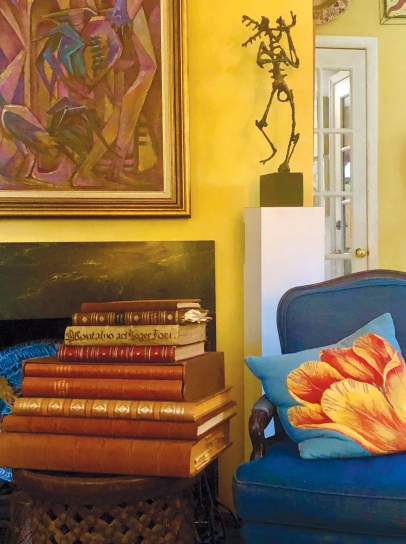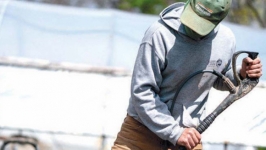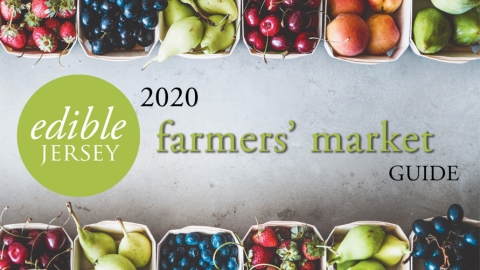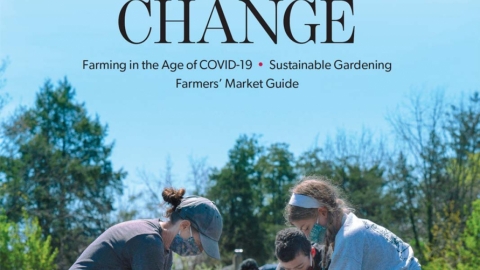Reflections in the Time of the Pandemic
Editor’s Note: The COVID-19 crisis has hit us all; we have been heartbroken, uplifted, unmoored. To help document the moment, Edible Jersey is sharing stories from our community.
A minute before midnight on New Year’s Eve, as I pondered what I might wish for the year and the decade to come, all I heard in my mind were the words of a poem by Antonio Machado, Caminante, no hay Comino.
Caminante, son tus huellas
el camino y nada más;
Caminante, no hay camino,
se hace camino al andar.
“Path-walker, your footprints and nothing else are the path; Path-walker, there is no path, the path is formed as you move.”
Machado’s words underscored my sense of foreboding for 2020, as if I knew that uncertainty would be my companion in days and perhaps years to come in a catastrophe of historic magnitude that threatens the core of our existence.
When the old year closed, I anticipated a transition from a trying period of losses to new endeavors focused on my cooking and writing, as well as projects that would require a process of reinvention, though they were rooted in decades of hard work. I didn’t foresee the global shocks of the next months, or the stages of grief I would pass through in my forced seclusion at home, from disbelief to defiance, from anger to acceptance. But I know now that no matter what we wish or vow to do in this year or decade, we will make our own history simply by being present, taking each day as a gift, and not looking back—except to find inspiration—at the path that we will never tread again.
I AM LOOKING FOR PRECEDENTS THAT CAN HELP ME GET A HISTORICAL PERSPECTIVE OF THE SEA CHANGE THAT IS COMING OUR WAY
Although I am always looking for the silver lining in the underbelly of every trial and challenge, coming to terms with the tangled web of what is happening around us has taken a toll on my wideeyed optimism. The closing of my restaurant, Cucharamama, and the worry I had about our employees made me feel like a boat adrift in stormy weather. When I last saw it after closing (with Clara Chaumont, my business partner), the restaurant looked as it always does minutes from opening its doors—cozy and welcoming, a magical carpet ready to transport our customers to a universe of our creation. Bringing it back before a vaccine eases fears of contagion will require funding and skillful planning to secure the safety of both our staff and customers. Will our waiters need to wear masks? If they do, I might design them myself with our logo or a clever pattern. How would they take orders from our customers while respecting the rules of social distancing?
These are practical musings that I can manage, but other concerns keep me awake at night. COVID-19 is a clear and present danger for everyone, lurking in every corner and claiming the lives of people I know. As I was tackling the early days of the lockdown and the logistics of the restaurant’s closing, one my dearest friends, a Cuban architect living in Madrid, was fighting for her life at a local hospital. I heard her labored raspy voice and uncontrollable bouts of dry cough, as well as vivid reports of her agony over the phone, and I was filled with fear and disbelief—even when she finally recovered.
What was happening to her in Madrid was also happening to us here in the US, and I was baffled by the failures of our country to tackle the crisis in the effective way that befits a superpower. And I asked myself: How is it possible, at the most basic level, that we cannot make masks, visors, and other protective gear fast enough to keep our physicians and health care workers, the heroes of our time, safe? I am married to one. I still do not understand why testing, the first step in controlling the spread of the disease, has not been implemented broadly. It is such a commonsense requirement.
PERHAPS I AM COMPELLED TO RETRACE MY STEPS, TO GAUGE HOW I NOW SEE WHAT USED TO BE MY WORLD.
Though what I see and hear is eroding my confidence, I also know in my heart that, when push comes to shove, this country can achieve the impossible if the private and public sectors work in synchrony and with a common purpose.
Doing domestic chores that I can control with a degree of efficiency, on the other hand, has kept me going: building a pantry for much more than two weeks, drawing and imagining the virus being eaten by the avenging monster that we know as soap, cooking nutritious and tasty food with more flair than is necessary for mere sustenance, and cleaning like a maniac as if trying to exorcise the negative by making dust and clutter vanish. I have found joy in being my home’s comfort manager. Unearthing old treasures hidden in drawers and bookcases has kept me alert and inspired.
In early April, I found the photo of a Muslim librarian in 1938 Jerusalem that I had bought in a wonderful little antique shop in the Old City several years ago. Looking at him, a guardian of books in a year of great turmoil for this most contested of cities, made me want to sit in a corner, just like him, and read quietly and with absolute concentration. Sitting motionless while books feed my mind and take me places is a luxury that only time can buy.
What’s on my lockdown reading list? Mostly books that I’ve read before. Organized in manageable piles by subject—regional cuisines, history, art and design, botany, cacao and chocolate—that I keep close to my favorite blue chair, they invite me to read with purpose. I am an omnivorous reader, but now I find myself gravitating to primary sources that require undivided attention. I am reading chronicles of the Spanish conquest of the Americas, my precious facsimiles of thirteenth-century Spanish manuscripts, and anything medieval. Go figure what this crisis has made me crave. Perhaps I am compelled to retrace my steps, to gauge how I now see what used to be my world.
I just devoured, for the second time, a timely book by my mentor and thesis advisor, Norman F. Cantor, titled In the Wake of the Plague: The Black Death and the World it Made. I heard Cantor, a great historian, prolific writer and thinker, lecture on many of the threads that he fully fleshed out in his book, written mostly while he was a Fulbright professor at the University of Tel Aviv. The book is fascinating for much more than the gory details of the disease itself, and I am going through every chapter as if studying for an exam to understand the ways in which European society unraveled and emerged transformed from a pandemic that took an estimated 200 million lives. I guess I am looking for precedents that can help me get a historical perspective of the sea change that is coming our way. Will we emerge shaken to the core, but better people? Will we finally understand just how fragile and interdependent we are? Will we take pity on our ailing planet? Will our restaurant culture reemerge with renewed vigor but with a clearer sense of purpose? I hope so. “There is no path, the path is formed as you move.”








